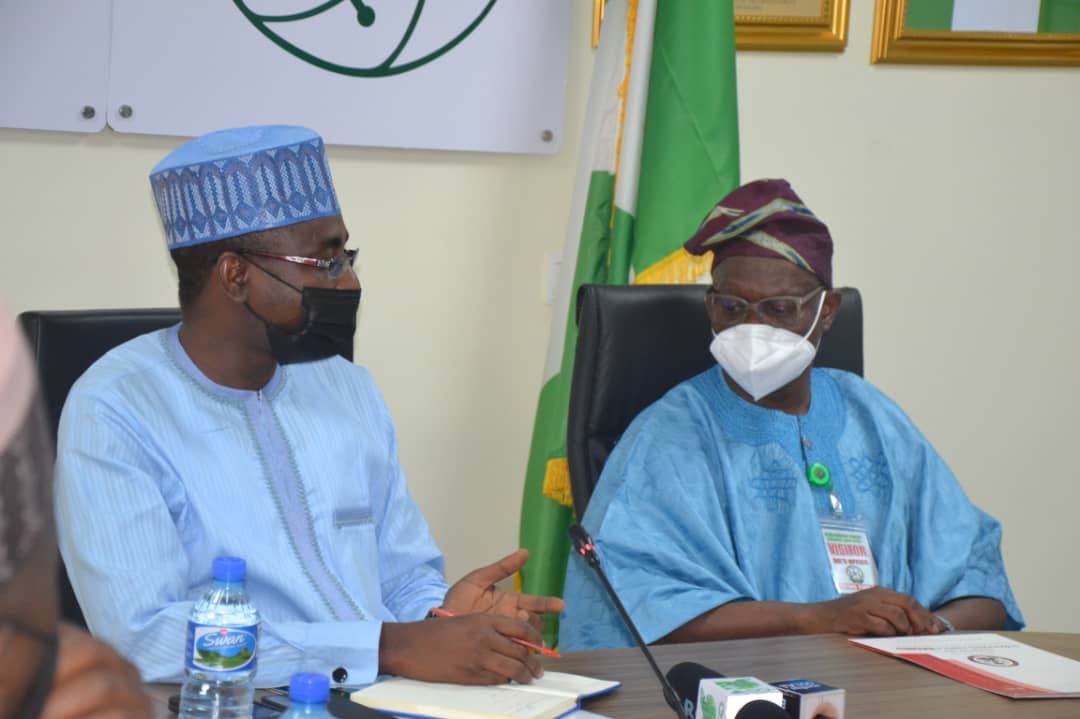ICT
Digital Economy: Why N’Assembly Must Repeal NITDA Act Now – Dr. Inuwa

Yemi Itodo
As Nigeria’s economy continues to drift from oil and gas to digital economy and data technology, the Director-General (DG) of National Information Technology Development Agency (NITDA), Dr. push({}); Kashifu Inuwa, has called on both chambers of the National Assembly to repeal the NITDA Act of 2007.
Dr. Inuwa made this call Thursday evening, while playing host to the Senate Committee Chairman on Media and Public Affairs, Senator Surajudeen Ajibola Bashiru at NITDA headquarters, Abuja.
According to Inuwa, the NITDA Act, which was signed in 2007, has become obsolete, irrelevant and unfit to assist Nigeria achieve her objectives of digital economy and green energy policies.
He added that, the agency was already on the right pedestal to make information and data technology, artificial intelligence development and other components of digital economy work for Nigeria, but expressed fears and worries that such policies would not work without an enabling laws, such as repealing the NITDA Act.
“We need a law to help us institutionalize and make it work. Even some of the vocabularies used in that law are obsolete and no longer in use. We need to change a lot of things and we need to do that as soon as possible, to enable us succeed in the area of green energy and information technology.
“We see IT or digital devices as enabling everything we do. About 80% of what we do everyday is powered by digital technology.
“How do we use artificial intelligence to improve our farm products and how to predict and share information about our farm. It is through the technology made available to us”, Inuwa said.
He said the agency was already working with the office of the Attorney-General of the Federation and relevant authorities, to submit a clean amendment Bill to the National Assembly for legislative work.
When repealed, the new NITDA Act would guarantee the safety of personal data of Nigerians as well as empowering NITDA in implementing the digital economy and data technology.
The law would also give the agency the capacity to regulate information technology based on Federal Government’s objectives, while promoting local and indigenous products and making Nigeria a hub for innovations.
Earlier, the Spokesman of the Senate, Senator Bashiru expressed satisfaction, on behalf of the Senate, over the progress made by NITDA in information technology and digital economy.
The lawmaker, while assuring the agency of possible collaborations in its duties, also alluded to the need for an enabling law to allow the agency function optimally.
“The 9th Senate would not hesitate to work with any agency that is willing to help the country move.
“We have a country that the population is growing and it is projected that in the next 10 years it would overshoot. The areas of green energy, ecosystem and agricultural productivity would be a great challenge, if we do not plan ahead. We look forward to your agency to assist in information technology by giving the needed guide for the growth of agriculture and our national economy.
“We should be net exporters of foods and not to he relying on other countries for food productions”, the lawmaker said.
Senator Bashiru also charged the DG to stern the capacity of his organization to be able to match the workforce needed for the education of the younger generations and in meeting up with the global trend of digital technology.
NITDA was established by President Olusegun Obasanjo in year 2001, as a hub for developing information technology for Nigeria. The agency, under the Ministry of Communication and Digital Economy, is expected to champion the roadmap for the implementation of digital economy policy of the Federal Government.
Author Profile
Latest entries
 InterviewsJuly 22, 2023Why I seek Urgent Intervention on Karim and Wurkin Ethnic Crisis – Hon Lauya
InterviewsJuly 22, 2023Why I seek Urgent Intervention on Karim and Wurkin Ethnic Crisis – Hon Lauya EducationJune 26, 2023Why I Support Fuel Subsidy Removal, How State Police Can Work – University Don
EducationJune 26, 2023Why I Support Fuel Subsidy Removal, How State Police Can Work – University Don NewsSeptember 2, 2022Regulations 2019: NAPTIP Extends 60 Days Ultimatum Issued To Private Shelters And Rehabilitation Homes
NewsSeptember 2, 2022Regulations 2019: NAPTIP Extends 60 Days Ultimatum Issued To Private Shelters And Rehabilitation Homes NewsJune 26, 2022Hon Buba Felicitates with Speaker Gbajabiamila at 60
NewsJune 26, 2022Hon Buba Felicitates with Speaker Gbajabiamila at 60
Article
Latest Report Reveals Oppo Smartphone Democratising Access To Professional-Grade Photography

By Abdulrahman Obaje
Improvements related to camera have been a major factor driving smartphone evolution over the past decade and the telephoto lens technology is among the important factors that determines how far the camera system can go, hence an indication of a larger trend in consumer behaviour, showing a preference for smartphones with enhanced photographic capabilities. adsbygoogle || []).push({}); adsbygoogle || []).push({}); January 2024 report of a market research firm, Counterpoint Research shows that the penetration rate has increased over the years to more than 19 per cent in H1 2023, nearly 3 per cent higher than it was in H1 2022.
So, what separates you from becoming a professional photographer this days is insignificant compare to the old ways of photography. It is just a thin line with the advent and rise in popularity of telephoto lenses in smartphones. This is because the growing trend in consumers’ desire for telephoto photography, something that can only be found exclusively in professional cameras; telephoto lenses integration in smartphones is now the main stay in the industry, a trend that industry player said is just the beginning of a larger trend.
Reports by Counterpoint had shed more light on the evolving landscape of smartphone photography. According to Counterpoint Research’s most recent report, more than 200 million telephoto lens-equipped smartphones were sold globally in 2022, with that figure expected to rise even further by 2024.
The telephoto lens feature was initially available exclusively on exceptional smartphones. However, the study has also found that mass-market adoption of telephoto lens is increasing, particularly among sub-$400 segments. The increasing popularity of telephoto lenses in affordable smartphones mirrors consumers’ inclination for advanced features without the accompanying high cost. In acknowledgment of this demand, smartphone manufacturers have promptly responded by enhancing their mid-tier line-ups with telephoto capabilities, enabling a broader audience to partake in upgraded photography experiences that were traditionally exclusive to high-end models.
Users can capture images that stand out for their precision and elegance. Apart from its ability to be able to capture a distant landscape, telephoto lens also stands out in shooting portrait as it can compress the subject and background, creating dramatic bokeh effect. The 50mm or 85mm equivalent focal length provides a field of view similar to human eyes with minimal distortions.
The report also revealed that these lenses are becoming increasingly integrated into smartphones around the globe. The ability to zoom without sacrificing image quality, combined with the unique visual effects a telephoto lens can produce, has made it a popular choice among smartphone users. The proportion of smartphones equipped with a telephoto camera has increased both internationally and in China, reaching 19.3% and 24.4%, respectively, demonstrating the importance of telephoto lenses in today’s mobile photography environment.
The report further revealed that the newly launched OPPO’s Reno11 series, positioned as “The Portrait Expert”, has been instrumental in bringing high-end telephoto lens features to more affordable smartphone models with the innovative “Telephoto Portrait” feature saying that OPPO has been instrumental in making high-quality mobile photography accessible to a greater majority of the masses.
“This strategic move by OPPO has not only democratized access to professional-grade photography features but also underscored the brand’s position as a leader in mobile photography innovation. ”, it said
The Reno11 series boasts features such as a 32MP 2x optical zoom camera powered by Sony IMX709 flagship sensor, enabling users to capture sharp, detailed images from a distance. The series also integrates advanced AI algorithms to enhance image quality, especially in portrait photography, providing users with the tools to capture life’s moments with unparalleled clarity and creativity.
The report thereby anticipates a positive outlook for telephoto lenses, affirming their pivotal contribution to the progression of mobile photography.
The integration of telephoto lenses is just the beginning of a larger trend. The future of mobile photography is expected to see upward progression, with telephoto lenses playing a significant role in how consumers capture and engage with the world around them. This trend is poised to redefine the standards of mobile photography, pushing the boundaries of what smartphones can achieve.
Abdulrahman Obaje is a Journalist, Mathematician and Computer Scientist based in Abuja, Nigeria.
Author Profile

- Prince Abdulrahman Obaje is a Media, Information and Computer Technology Consultant. A quintessential Journalist, online marketer, social media strategist, Mathematician and Computer Scientist is based in Abuja, Nigeria. He is the Founder and the Publisher of The Informavores!. You can reach me on +234 805 939 5252 or send i-witness report directly to me on news@informavores.com.ng.
Latest entries
 ArticleApril 24, 2024Preventing Fire Outbreak in Solar Power System Installation – Engr Ohida
ArticleApril 24, 2024Preventing Fire Outbreak in Solar Power System Installation – Engr Ohida PoliticsApril 23, 2024Alleged 80.2 Billion Fraud: EFCC May Loose Case Against Yahaya Bello – Ambassador Danjuma
PoliticsApril 23, 2024Alleged 80.2 Billion Fraud: EFCC May Loose Case Against Yahaya Bello – Ambassador Danjuma NewsApril 11, 2024Eid-El-Fitr: ICDA North Central Coordinator Urges Muslim Faithfuls To Abide By Ramadan Lessons
NewsApril 11, 2024Eid-El-Fitr: ICDA North Central Coordinator Urges Muslim Faithfuls To Abide By Ramadan Lessons NewsMarch 20, 2024Investigative Journalists Group, NGIJ Hails Aderinokun on Appointment as Head of Media at Access Corp
NewsMarch 20, 2024Investigative Journalists Group, NGIJ Hails Aderinokun on Appointment as Head of Media at Access Corp
Article
Why We Must Not Lose Guard About The Potential Risks Of AI – Part 1

By Abdulrahman Obaje
The most globally talked about scientific discipline at present is AI, short form of Artificial Intelligence, garnering attentions from main stream media organisations such as CNN, BBC, Forbes, New York Times, Daily Trust newspaper and the kinds of them. adsbygoogle || []).push({}); adsbygoogle || []).push({}); Unfortunately this technology also poses the most threats to society and humanity at present.
AI is a scenario whereby a piece of an electronic device or software behaves as though it is digital human assistant. Some can make and take decisions that ordinarily may take time for human being to accomplish. AI-based device may be trained to even perform responsibilities that usually requires human intelligence to accomplish. Such tasks include solving complex mathematical problem, complex medical diagnosis, language translation, etc.
Example include Language translators, Facial recognition capabilities on mobile phones and other devices, Facebook’s language translation feature, Google Assistant on Android, Siri on iPhones, friend suggestions on Facebook to mention but few. An AI-based system can actually act like a smart helpful digital friend.
AI serves as the foundation for transformative technologies like the much talked about ChatGPT with more than 18 million active users daily. Now, the GPTs store has been launched for business. Also, AI non-invasive device to read what a human is thinking in his mind, convert it to text and display the text on a screen. The research that has been conducted and pilot tested in the University of Sydney has a multifaceted benefit to the human. Anyone with speech impairment can use the device to communicate his or her thoughts and wants with people without talking.
As modern Artificial Intelligent-based systems are now being trained to learn from past experience; in the form of gathered information, making it able to adjust to new information that enable it to be independent in some areas to some extents, the voice of warning against the potential risks of AI is growing louder.
The tech community has long debated the threats posed by artificial intelligence. Automation of jobs, the spread of fake news and a dangerous arms race of AI-powered weaponry have been mentioned as some of the biggest threats posed by AI.
There is also growing concerns that these things could get more intelligent than the humans and that they could one day decide to take over, and that there is why we need to worry about how we prevent that from happening.
A Computer Scientist, Geofrey Hinton also dubbed as the Godfather of Artificial Intelligence, a name he got from his foundational work on machine learning and neural network algorithm, in 2023 left his position at Google to talk about the risk of Artificial Intelligence, insinuating that a part of him even regrets his life’s work.
Hinton is not alone in this concerns. More than 20,000 tech leaders had in March 2023 persuaded in an open letter to put a pause on large AI experiments, citing that the technology can pose profound risk to society and humanity.
According to Wikipaedia, Pause Giant AI Experiments: An Open Letter is the title of a letter published by the Future of Life Institute in March 2023. The letter calls “all AI labs to immediately pause for at least 6 months the training of AI systems more powerful than GPT-4”, citing risks such as AI-generated propaganda, extreme automation of jobs, human obsolescence, and a society-wide loss of control. It received more than 20,000 signatures, including academic AI researchers and industry CEOs such as Yoshua Bengio, Stuart Russell, Elon Musk, Steve Wozniak and Yuval Noah Harari.
One of the risks posed by AI system is the lack of AI transparency and explainability. This is as AI and deep learning models can be difficult to understand, even for those that are working directly with the technology. This leads to a lack of transparency for why and how Artificial Intelligence comes to its conclusions. This conclusion cannot be trusted one hundred percent of times because of lack of explanation for what data AI algorithms use, or why AI may make biased or unsafe decisions. These concerns explain the rise to the use of explainable AI, but there’s still a long way before transparent AI systems can become common practice.
The second area of concern is job loss due to job automation. As AI-powered job automation is adopted in industries like marketing, manufacturing and healthcare. By 2030, tasks that account for up to 30 percent of hours currently being worked in the U.S. economy could be automated. According to McKinsey. Black and Hispanic employees especially is more vulnerable to the change while Goldman Sachs even states 300 million full-time jobs could be lost to AI automation.
“The reason we have a low unemployment rate, which doesn’t actually capture people that aren’t looking for work, is largely that lower-wage service sector jobs have been pretty robustly created by this economy,” futurist Martin Ford told Built In. With AI on the rise, though, “I don’t think that’s going to continue.”
As AI robots become smarter and more dexterous, the same tasks will require fewer humans. And while AI is estimated to create 97 million new jobs by 2025, many employees won’t have the skills needed for these technical roles and could get left behind if companies don’t upskill their workforces.
The third area of risks poses by AI is Social manipulation. This fear has become a reality as politicians rely on platforms to promote their viewpoints. For example Ferdinand Marcos, Jr., wielded a TikTok troll army to capture the votes of younger Filipinos during the Philippines’ 2022 election.
TikTok, which is one example of a social media platform that relies on AI algorithms, fills a user’s feed with content related to previous media they’ve viewed on the platform. Criticism of the app targets this process and the algorithm’s failure to filter out harmful and inaccurate content, raising concerns over TikTok’s ability to protect its users from misleading information.
Online media and news have become even murkier in the wake of AI-generated content such as images and videos, AI voice changers as well as deepfakes infiltrating political and social spheres. These technologies make it easy to create realistic photos, videos, audio clips or replace the image of one figure with another in an existing picture or video. As a result, bad actors have another avenue for sharing misinformation and war propaganda, creating a nightmare scenario where it can be nearly impossible to distinguish between creditable and faulty news.
“No one knows what’s real and what’s not,” Ford said. “So it really leads to a situation where you literally cannot believe your own eyes and ears; you can’t rely on what, historically, we’ve considered to be the best possible evidence… That’s going to be a huge issue.”
Abdulrahman Obaje is a Journalist, Mathematician and Computer Scientist based in Abuja, Nigeria.
Author Profile

- Prince Abdulrahman Obaje is a Media, Information and Computer Technology Consultant. A quintessential Journalist, online marketer, social media strategist, Mathematician and Computer Scientist is based in Abuja, Nigeria. He is the Founder and the Publisher of The Informavores!. You can reach me on +234 805 939 5252 or send i-witness report directly to me on news@informavores.com.ng.
Latest entries
 ArticleApril 24, 2024Preventing Fire Outbreak in Solar Power System Installation – Engr Ohida
ArticleApril 24, 2024Preventing Fire Outbreak in Solar Power System Installation – Engr Ohida PoliticsApril 23, 2024Alleged 80.2 Billion Fraud: EFCC May Loose Case Against Yahaya Bello – Ambassador Danjuma
PoliticsApril 23, 2024Alleged 80.2 Billion Fraud: EFCC May Loose Case Against Yahaya Bello – Ambassador Danjuma NewsApril 11, 2024Eid-El-Fitr: ICDA North Central Coordinator Urges Muslim Faithfuls To Abide By Ramadan Lessons
NewsApril 11, 2024Eid-El-Fitr: ICDA North Central Coordinator Urges Muslim Faithfuls To Abide By Ramadan Lessons NewsMarch 20, 2024Investigative Journalists Group, NGIJ Hails Aderinokun on Appointment as Head of Media at Access Corp
NewsMarch 20, 2024Investigative Journalists Group, NGIJ Hails Aderinokun on Appointment as Head of Media at Access Corp
ICT
Product Review: OPPO Reno11 smartphone

On January 11th, 2024, Folashade Omonijo, Marketing Manager, OPPO NG said OPPO is the world’s leading smart device brand, announcing the global availability of its OPPO Reno11 smartphone with the gracing presence of popular celebrities and media partners at it’s launch event.
adsbygoogle || []).push({}); adsbygoogle || []).push({}); Fusing eye-catching elegance with an Ultra-Clear Portrait Camera System, spearheaded by a 50MP Main Camera with OIS, and sporting dual stereo speakers, Reno11 unlocks class-leading entertainment, day-long battery life and best-in-class charging speeds.
OPPO Reno11 smartphone Launches Globally with Sleek Styling, Superb Experiences and an Ultra-Clear Portrait Camera System
She further said that, “Reno11 shines with superb experiences, thin and light design, and excellent entertainment credentials. Its Ultra-Clear Portrait Camera System turns it into a creative powerhouse and the long-lasting, fast-charging battery cements Reno11’s winning balance of style and substance.”
Informavores! finds below, some of the features that makes the smart phone to stand-out as it launches Globally with Sleek Styling, Superb Experiences and an Ultra-Clear Portrait Camera System:
Elevated Style meets Brilliant Visuals and Stereo Sound
Reno11 flows effortlessly into your life with its gorgeous 3D Curved Design and a slim and lightweight body. At just 7.99mm1 thin, it feels sleek, and weighing 182g, is comfortable to hold, even after long bouts of streaming or reading.
Looking striking with its Shimmering Silk Design and OPPO Glow technique, OPPO’s honed its design process to achieve a beautifully textured look with a smooth feel. Available in two colours, Wave Green and Rock Grey, both are inspired by nature and catch light exquisitely.
In Wave Green, Reno11 conjures images of green sea waves under a clear sky with its Shimmering Silk Design. To achieve this elegant style, OPPO pioneered a new technique of pattern transfer from natural fabric, adding an organic authenticity to Reno11’s aesthetic.
For more subdued style, Reno11 in Rock Grey reveals layers of bright and soft silver-grey glitter when held up to the light. Manufactured with the exclusive OPPO Glow process, tiny sparkling crystals are etched at the microscopic level to create a finish that not only sparkles, but also appears soft and smooth.

Embracing contrast, Reno11’s Sunshine Ring camera system rises from its rich-looking back, teasing the capable Ultra-Clear Portrait Camera System within.
When using Reno11, its 120Hz 3D curved screen pulls focus with its large 6.7” size and punchy display technology. Framed by an ultra-slim border for an almost all-screen experience, its 93% screen-to-body ratio is both supremely immersive and class-leading.
This immersion continues to Reno11’s brilliant 10-bit AMOLED screen, showcasing over 1 billion colours for natural-looking gradients and more true-to-life visuals. HDR10+ certification conjures enchanting highlights and atmospheric shadows, and with dual stereo speakers, movies and shows sound as good as they look.
Crank up your favourite tunes or give quiet tracks a boost with Reno11’s Ultra Volume Mode, with 300% volume from the dual stereo loudspeakers. Reno11 also boosts in-call volume by up to 200% for easy-to-hear conversations
Strike a Pose with Portrait-Perfect Photos And Enjoy studio-grade portrait photography with OPPO Reno1
With OPPO’s Ultra-Clear Portrait Camera System, Reno11 captures studio-grade portrait photography.

Get up close to subjects with a 32MP telephoto camera matched with a 47mm equivalent, 2x telephoto zoom which captures with a classical point of view for portraits, similar to the perspective of a human eye. The Sony IMX709 sensor powering this 2x experience doesn’t just capture crisp, detailed photos, it also features an RGBW pixel arrangement for a 60% increase in photosensitivity and 35% less noise than comparable traditional sensors.
With a powerful 50MP Ultra-Clear Main Camera with OIS, a fast f/1.8 lens and Sony’s new LYT600 sensor, expect an impressive, all-purpose camera you can lean on. And for expansive landscapes, Reno11’s ultra-wide 8MP camera covers an all-seeing 112º field of view
Reno11’s camera takes portrait imaging beyond hardware. Having teamed up with portrait photography experts from around the world, OPPO’s Portrait Expert Engine powers Reno11’s portrait photography. This engine results in a four-part process to capture tasteful, beautiful portrait photos, starting with Facial Recognition + Subject/Scene Separation, followed by Skin Tone Protection, then Clarity and Facial Enhancement, and finally Portrait and Environment Merging.

Reno11 combines this advanced portrait algorithm with its pro-grade Portrait Mode. This captures natural-looking portraits at either 1x or 2x zoom with incredible subject, object, and edge separation. In addition, advanced flattering safeguards individuality, while adjustable bokeh empowers the photographer to adjust focus more precisely.
More than a versatile stills camera, Reno11 also captures 4K ultra-clear video from both the main camera and 32MP selfie camera, so you can record, vlog, post and express yourself without sacrificing on quality
ColorOS 14 for Effortless Work and Play
So much more than just stylish, the Reno11 ColorOS 14 experience is exceptional, fusing beauty, security, productivity, reliability, and longevity.
With File Dock, easily save images, text or files for quick drag-and-drop access across your apps. Smart Touch captures images, text, and even text within images from a screenshot with ease. Finally, Smart Image Matting easily, quickly cuts out up to six subjects from a photo and saves the image in File Dock, so you can turn it into a sticker or share it directly with another app.

Behind the scenes, ColorOS 14’s next-generation Trinity Engine ensures fast and smooth performance. ROM Vitalisation can save up to 19GB of extra space from a total 256GB storage2 by compressing unused data and removing duplicated files. RAM Vitalisation can keep up to 28 apps running in the background for 72 hours2. While CPU Vitalisation learns usage habits and optimises processes for a smoother, longer-lasting experience2. OPPO’s 48-Month Fluency Protection also means Reno11 is optimised for today, tomorrow, and years to come
Flagship-level Connectivity and an End to Battery Anxiety
Reno11 is powered by a MediaTek Dimensity 7050 chipset, delivering 6nm computing that makes confident multi-tasking, gaming and demanding tasks like 4K video capture possible.
Up to 12GB RAM and an additional 12GB available with RAM Expansion means Reno11 can work across multiple apps and games without background apps being closed. And with 128GB or 256GB storage and storage expansion of up to 2TB via microSD card, enjoy a library of offline movies and games, making Reno11 a perfect travel companion.
For stable signal you can rely on, whether browsing, talking or texting, OPPO’s self-developed network optimisation engine, LinkBoost, achieves up to 100% higher signal transmission and 44% stronger reception than competitor devices2. LinkBoost combines AI network selection and a 360-degree surround antenna design for the most stable signal possible with minimum downtime.

For Reno11 users in India, Indonesia, Malaysia, Thailand, Vietnam and Mexico, OPPO has taken LinkBoost even further, tuning the technology to get you back online up to 87% faster than competing devices after leaving an elevator, dropping signal in a fast-moving vehicle, a crowded environment or when underground.
Go the distance with Reno11’s long-lasting, large 5000mAh battery, confidently getting you through a full, connected day, and with OPPO’s Battery Health Engine, look forward to four years of day-long use2. When you do need to power up, unlock 67W SUPERVOOCTM Flash Charging4 using the supplied charger for a 33% top-up in 10 minutes2, and a 100% charge in just 45 minutes.
So, OPPO is a leading global smart device brand. Since the launch of its first mobile phone – Smiley Face – in 2008, OPPO has been in relentless pursuit of the perfect synergy of aesthetic satisfaction and innovative technology. Today, OPPO provides a wide range of smart devices spearheaded by the Find and Reno series.
Beyond devices, OPPO also provides its users with ColorOS operating system and internet services such as OPPO Cloud and OPPO+. OPPO has footprints in more than 60 countries and regions, with more than 40,000 employees dedicated to creating a better life for customers around the world
Author Profile

- Prince Abdulrahman Obaje is a Media, Information and Computer Technology Consultant. A quintessential Journalist, online marketer, social media strategist, Mathematician and Computer Scientist is based in Abuja, Nigeria. He is the Founder and the Publisher of The Informavores!. You can reach me on +234 805 939 5252 or send i-witness report directly to me on news@informavores.com.ng.
Latest entries
 ArticleApril 24, 2024Preventing Fire Outbreak in Solar Power System Installation – Engr Ohida
ArticleApril 24, 2024Preventing Fire Outbreak in Solar Power System Installation – Engr Ohida PoliticsApril 23, 2024Alleged 80.2 Billion Fraud: EFCC May Loose Case Against Yahaya Bello – Ambassador Danjuma
PoliticsApril 23, 2024Alleged 80.2 Billion Fraud: EFCC May Loose Case Against Yahaya Bello – Ambassador Danjuma NewsApril 11, 2024Eid-El-Fitr: ICDA North Central Coordinator Urges Muslim Faithfuls To Abide By Ramadan Lessons
NewsApril 11, 2024Eid-El-Fitr: ICDA North Central Coordinator Urges Muslim Faithfuls To Abide By Ramadan Lessons NewsMarch 20, 2024Investigative Journalists Group, NGIJ Hails Aderinokun on Appointment as Head of Media at Access Corp
NewsMarch 20, 2024Investigative Journalists Group, NGIJ Hails Aderinokun on Appointment as Head of Media at Access Corp
